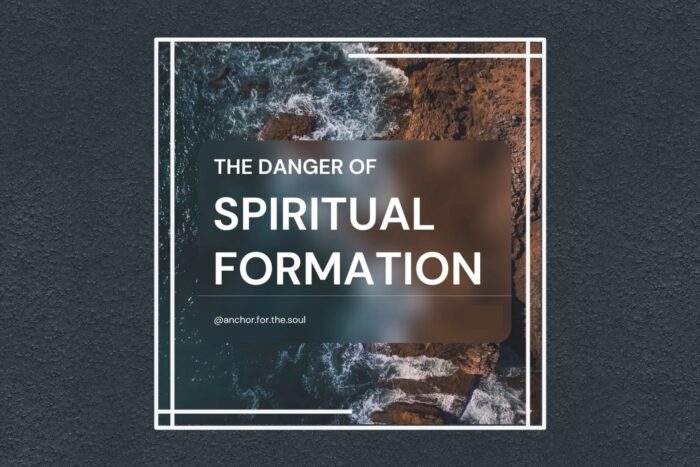As many of you know, my oldest daughter writes at Anchor for the Soul (found on Facebook and Instagram). She’s been extremely busy with her young family but she did find some time to dig into the spiritual formation movement recently and find out just what it’s about. I want to share what she shared here on the blog (with her permission) since I know you aren’t all on social media and also because it is easier to print and to share with others who aren’t on social media from this platform.
I don’t feel like we Christians, as a whole, recognize the danger of spiritual formation and how it is changing the entire landscape of what has been known traditionally as “Christianity”. It’s been going on for years, but has taken on a life of its own in the last twenty or so years, carving and creating a new religion that uses the same terms we use and claims to worship the same God we worship, and read the same Bible we read and, yet, clearly—when evaluated, the two religions—biblical Christianity and Christianity formed by spiritual formation principles—are as different as day and night. And, in fact, one represents day and light and the other represents night and darkness.
I hope what is written below will help us all discern as this movement snakes its way into college classrooms, board rooms, and churches. I hope this will help us be aware of what’s going on and evaluate it according to scripture.
Spiritual formation is currently taking the Christian world by storm. Nearly every Christian college and seminary is teaching it. It’s the topic of popular Christian books, articles, and podcasts. Churches are recommending it, small groups are studying it, and pastors are preaching about it. But what is spiritual formation? Is it something Christians should embrace, ignore, or oppose?
Richard Foster was one of the first to introduce the idea of spiritual formation to the evangelical world. He defined it as “a God-ordained process [of spiritual disciplines] that shapes our entire person so that we take on the character and being of Christ Himself.” Someone else defined it as “active participation with the Holy Spirit through spiritual practices that leads to our conformity to Christ.” Those definitions don’t seem too bad at first glance. But what are these spiritual disciplines and practices?
Biblical disciplines such as Bible study and prayer are framed as quaint and simplistic. In fact, most spiritual formation experts would tell you that these disciplines are forged from a “western worldview of the head” and can only lead you so far in your spiritual journey. If you want to go deeper— to connect with God, experience His presence, and become like Him— you need more. If you’re tired of living a boring, Christian life and have grown weary of the superficial modern church— you’re missing something. And what is this more you’re missing? Disciplines practiced by the spiritual masters of old.
𝐓𝐇𝐄 𝐒𝐎𝐔𝐑𝐂𝐄
So-called desert fathers and mothers set up the first monastic communities in the Egyptian wilderness and lived as hermits during the third to sixth centuries. These men and women claimed to have encountered and experienced God on a deeper level and received direct revelation from Him. These are the very ones that spiritual formation experts (such as Richard Foster, Dallas Willard, Bruce Demarest, and John Mark Comer) call the “spiritual masters” and from whom they draw their understanding of spiritual formation. Others who followed after these desert fathers and mothers include St. Francis of Assisi, St. John of the Cross, Brother Lawrence, Teresa of Avila, Henri Nouwen, Julian of Norwich, Francis De Sales, Thomas Keating, and Thomas Merton. A quick Google search will reveal that these individuals were all Catholic priests, monks, or nuns and every single one of them was a mystic seeking union with God through occult practices.
Many, if not all, of the classic spiritual disciplines within the spiritual formation movement are drawn from the writings of these individuals. They are quoted endlessly by proponents of spiritual formation. You will not find one book on the topic of spiritual formation that does not find itself unashamedly rooted in Catholic mysticism.
And herein lies the first problem— 𝐢𝐟 𝐭𝐡𝐞 𝐬𝐨𝐮𝐫𝐜𝐞 𝐨𝐟 𝐬𝐩𝐢𝐫𝐢𝐭𝐮𝐚𝐥 𝐟𝐨𝐫𝐦𝐚𝐭𝐢𝐨𝐧 𝐢𝐬 𝐭𝐡𝐞 𝐰𝐫𝐢𝐭𝐢𝐧𝐠𝐬 𝐨𝐟 𝐮𝐧𝐬𝐚𝐯𝐞𝐝, 𝐂𝐚𝐭𝐡𝐨𝐥𝐢𝐜 𝐦𝐲𝐬𝐭𝐢𝐜𝐬, 𝐡𝐨𝐰 𝐜𝐚𝐧 𝐢𝐭 𝐩𝐨𝐬𝐬𝐢𝐛𝐥𝐲 𝐛𝐞 𝐨𝐟 𝐆𝐨𝐝?
𝐓𝐇𝐄 𝐃𝐈𝐒𝐂𝐈𝐏𝐋𝐈𝐍𝐄𝐒
Each author or speaker on spiritual formation will most likely offer a unique list of spiritual disciplines. But here are a few of the most common:
silence & solitude— removing all noise and distractions so that you can simply sit in silence and be present with God
contemplative prayer & meditation— a practice involving clearing one’s mind so you can better connect with God and listen for His voice and guidance
lectio divina— reading a passage over and over, being drawn into God’s presence and experiencing Him through Scripture
fasting— abstaining from food, drink or other activities for a certain amount of time
confession— confessing your sins to someone
simplicity— living a life of simplicity
chastity— stepping away from sexual activity for a certain amount of time
generosity and service— giving of your time, money, and resources to bless and serve others
sabbath rest— choosing one day of the week to step away from work, chores, and distractions
community— cultivating a close-knit community around you
worship— worshipping God in song, actions, or words
justice— pursuing justice in the world around you
journaling— writing in a spiritual journal
observing the liturgical calendar— advent, lent, easter, and pentecost
Of course, they often include reading the Bible and prayer amongst these disciplines but one thing they make clear— they are not enough. They only reach the head while the rest of them reach the heart.
The beginning of this list reveals the second problem— 𝐦𝐚𝐧𝐲 𝐨𝐟 𝐭𝐡𝐞 𝐬𝐩𝐢𝐫𝐢𝐭𝐮𝐚𝐥 𝐝𝐢𝐬𝐜𝐢𝐩𝐥𝐢𝐧𝐞𝐬 𝐚𝐫𝐞 𝐝𝐞𝐫𝐢𝐯𝐞𝐝 𝐝𝐢𝐫𝐞𝐜𝐭𝐥𝐲 𝐟𝐫𝐨𝐦 𝐦𝐲𝐬𝐭𝐢𝐜𝐢𝐬𝐦. These include silence, solitude, meditation, contemplative prayer, and lectio divina. They might couch them in Christian terminology but there can be no “Christian version” of occult practices.
God did not provide the supernatural encounters and visions experienced by the Catholic mystics through these practices. That was Satan. If spiritual formation gurus are practicing the same things and seeking the same experiences, they will be met with the same result— experiences that they attribute to God but are of the devil himself.
Some of these disciplines seem like good things. Is it good to be generous, take a day of rest, cultivate community, fast, worship, confess our sins, and serve? Yes. But do those things, in and of themselves, sanctify us and makes us like Christ? No. And this leads us to the third problem.
𝐓𝐇𝐄 𝐏𝐇𝐈𝐋𝐎𝐒𝐎𝐏𝐇𝐘
They will tell you that the process of practicing spiritual disciplines is what makes us like Christ. They will tell you that spiritual formation is the way in which we are sanctified, transformed, abide, and set apart. It’s the way we take up our cross and follow Jesus. We become more like Christ not through the Word of God but through experiencing God, connecting with God, encountering Him, or “entering into the inner life of God” through spiritual practices.
But is this Biblical? Does Scripture teach any of these disciplines as a means of spiritual growth and progressive sanctification? Let’s find out what the Bible tells us about being transformed, sanctified, and made like Christ.
2 Thess. 2:13— by the power of the spirit through belief in the truth
John 17:17— through the Word of God
2 Timothy 3:16-17— through the Word of God
James 1:2— through suffering
Hebrews 4:12-16— through the Word of God and prayer
2 Peter 1:3— through knowledge of Christ
Ephesians 4:11-16— through the preaching of the Word
Romans 12:2— through the renewing of our minds in the Truth
Galatians 5:16— walking with the spirit, denying the flesh
The Bible is very clear. We are sanctified or made holy by the power of the Holy Spirit through the Word of God. Not just simply reading it but trusting it and obeying it. We pray for God to transform us and change us. We grow in faith through the Word preached and discipleship in the Word from other believers. We learn to love God and others not by experiencing or encountering God in some mystical way but through the knowledge of Him as revealed in His Word. So here’s the third problem— 𝐭𝐡𝐞 𝐩𝐫𝐚𝐜𝐭𝐢𝐜𝐞𝐬 𝐚𝐧𝐝 𝐝𝐢𝐬𝐜𝐢𝐩𝐥𝐢𝐧𝐞𝐬 𝐰𝐢𝐭𝐡𝐢𝐧 𝐭𝐡𝐞 𝐬𝐩𝐢𝐫𝐢𝐭𝐮𝐚𝐥 𝐟𝐨𝐫𝐦𝐚𝐭𝐢𝐨𝐧 𝐦𝐨𝐯𝐞𝐦𝐞𝐧𝐭 𝐚𝐫𝐞 𝐧𝐞𝐯𝐞𝐫 𝐦𝐞𝐧𝐭𝐢𝐨𝐧𝐞𝐝 𝐢𝐧 𝐭𝐡𝐞 𝐁𝐢𝐛𝐥𝐞 𝐚𝐬 𝐚 𝐦𝐞𝐚𝐧𝐬 𝐨𝐟 𝐬𝐚𝐧𝐜𝐭𝐢𝐟𝐢𝐜𝐚𝐭𝐢𝐨𝐧 𝐨𝐫 𝐬𝐩𝐢𝐫𝐢𝐭𝐮𝐚𝐥 𝐠𝐫𝐨𝐰𝐭𝐡.
So how can Christian authors be so assertive in recommending them?
𝐓𝐇𝐄𝐈𝐑 𝐁𝐈𝐁𝐋𝐈𝐂𝐀𝐋 “𝐄𝐕𝐈𝐃𝐄𝐍𝐂𝐄”
Spiritual formation proponents have to give some sort of Biblical foundation for spiritual formation if it’s going to reach a Christian audience. So how do they do it? How have they convinced thousands of people that occult practices rooted in Catholicism are the God-ordained means of sanctification in the life of a believer?
First, they tell you that these practices were so integrated into the lives of the New Testament authors that they didn’t even need to write them down. They were already being practiced by the apostles and the early church and we should follow their example. But the Lord has given us all the teachings and practices He wants us to follow within His Word. There is no secret key to a deeper spiritual life found outside of it.
Secondly, they’ll tell you that Jesus practiced the spiritual disciplines and that we must follow His example. Jesus practiced solitude and silence when he went away by Himself to pray. He practiced simplicity by living a simple life. He practiced secrecy when he healed away from the crowds. He practiced community by surrounding Himself with the disciples. He practiced celebration, fasting, sabbath rest, and justice. To model our life after Jesus is to practice these things.
This is problematic on so many levels. First, they are inferring that Jesus was practicing some kind of mystical solitude or meditation when He went off alone to pray. That’s quite an assumption. And to take His lone actions and call it a “practice” or a “discipline” we need to follow— without one Scripture reference to back it up— is far-reaching at best. Jesus Christ had plenty to say and never once did He talk about a practice or discipline as described by the spiritual formation movement.
𝐀𝐧𝐝 𝐬𝐨 𝐭𝐡𝐢𝐬 𝐢𝐬 𝐚𝐧𝐨𝐭𝐡𝐞𝐫 𝐦𝐚𝐣𝐨𝐫 𝐩𝐫𝐨𝐛𝐥𝐞𝐦— 𝐭𝐡𝐞𝐢𝐫 𝐁𝐢𝐛𝐥𝐢𝐜𝐚𝐥 𝐩𝐫𝐨𝐨𝐟 𝐟𝐨𝐫 𝐬𝐩𝐢𝐫𝐢𝐭𝐮𝐚𝐥 𝐝𝐢𝐬𝐜𝐢𝐩𝐥𝐢𝐧𝐞𝐬 𝐢𝐬 𝐧𝐨𝐭 𝐁𝐢𝐛𝐥𝐢𝐜𝐚𝐥 𝐚𝐭 𝐚𝐥𝐥.
𝐂𝐎𝐍𝐂𝐋𝐔𝐒𝐈𝐎𝐍
Spiritual formation asks some important questions. Is there something deeper than the superficial Christianity we see today in the modern church? What does it really look like to be a disciple of Jesus? How do we change and become more like Christ? But they give all the wrong answers.
The true answer is Biblical faith. We read the Bible, we believe the Bible, and we obey the Bible. That’s true faith in a nutshell. God, in His grace, opens our eyes to the truth of the Gospel and His Word and we submit to it. The Holy Spirit changes us— little by little— and makes us like Christ through the Word. Of course, we won’t know all of the Bible at once. But we trust and obey what we do know and continue to do the same thing as we learn it more. Sometimes feelings are there and sometimes they’re not but we choose to trust it anyways. God’s Word is the key to genuine faith, true discipleship, and transformation into the image of Christ.
But in spiritual formation, God’s Word takes a back seat and experience reigns supreme. How do you know you have true faith? Experiencing God’s presence and encountering Him through these spiritual disciplines. How do you become a disciple and follower of Christ? By practicing His way of life. How do you become more like Jesus? Through a list of disciplines that somehow the Holy Spirit will use to supernaturally transform you into the image of Christ. Even if those disciplines are rooted in mysticism and are never mentioned in Scripture.
The danger is that unbiblical practices will give people a real spiritual experience, but not from God. God puts a boundary around the means by which we come to Him and grow in Him for our own protection. If we ignore the Biblical guidelines, there is no telling where we might end up. Deception is the guaranteed outcome. Spiritual formation is nothing more than mysticism wrapped up in Christian language.
What makes spiritual formation so tricky is that not only do they ask good questions but they often say good things- slowing down and removing distractions, cultivating community, confessing our sins to one another, being generous with our time and money, making time to pray and study. But they don’t present those things within a Biblical framework. They’re presented within a mystical framework.
I’ve really just scratched the surface of the dangers of this movement. They redefine sin, hell, atonement, the purpose of the Gospel, and Jesus Christ. They expertly couch new age, occult philosophies in Christian terminology. They’ve usurped the purpose of sanctification from becoming holy to simply becoming “a person of love”. The battle against sin, flesh, and the world in the life of a Christian is ignored. Perhaps I’ll touch on these things in another post. But for now, I hope you find this information helpful!










